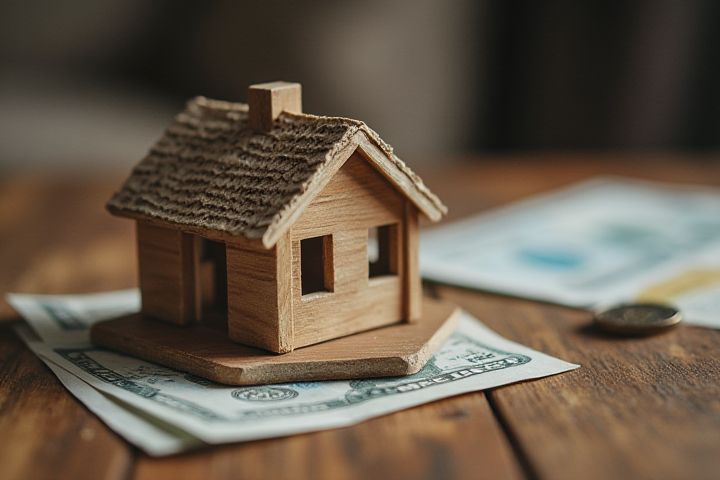
Bartering for a house is a unique transaction that involves negotiating terms with the homeowner without the use of cash. This can include offering goods, services, or other real estate as part of the exchange. Ensure both parties have a clear understanding of the property's value, which often requires an appraisal to prevent discrepancies. Legal considerations must be addressed, including proper contracts and any necessary inspections, to protect both the buyer and seller. If you're considering bartering for a house, consulting with a real estate attorney can help navigate the complexities of the agreement.
Can You Barter For A House
Market conditions
Bartering for a house hinges significantly on current market conditions, which dictate property values and buyer-seller relationships. In a seller's market, where demand exceeds supply, convincing a homeowner to accept goods or services instead of cash can be challenging, as they may prefer traditional offers. Conversely, in a buyer's market, characterized by an oversupply of homes and declining prices, homeowners might be more open to unconventional arrangements such as bartering. Understanding local real estate trends, including average days on the market and recent sale prices, is crucial when proposing a barter deal to ensure that both parties see value in the exchange.
Property valuation
Bartering for a house involves trading goods or services rather than using cash, making it essential to accurately assess property valuation. Factors influencing this valuation include location, property size, condition, and current market trends in real estate. You must ensure that the items or services you offer have equivalent value to the home, which often requires a thorough appraisal and negotiation process. Understanding the property's worth relative to comparable sales in the area will help you make a more informed proposal.
Legal implications
Bartering for a house involves exchanging goods or services without using cash, which introduces complex legal implications. Both parties must consent to the exchange and ensure that the property is legally transferable, requiring clear title and absence of liens. You should also consider potential tax liabilities, as the Internal Revenue Service treats bartered property transactions as taxable events. Consulting with a real estate attorney is essential to navigate these legal nuances and draft a proper barter agreement that protects your interests.
**Tax considerations**
When bartering for a house, understanding the tax implications is crucial. The IRS typically treats bartering as a taxable event, meaning that both parties may need to report the fair market value of the property exchanged. If you receive a home worth $300,000 through bartering, you could be liable for taxes based on that amount, despite not receiving cash. It's essential to consult a tax professional to ensure compliance and optimize your potential tax outcomes during the transaction.
**Offer flexibility**
To successfully barter for a house, you should prioritize offering flexibility in your terms. Consider adjusting your payment timeline, such as proposing an extended closing date that accommodates the seller's needs, which can make your offer more appealing. You can also be flexible with contingencies, like waiving minor inspections or offering to purchase the home "as-is" to expedite the process. By demonstrating this willingness to adapt, you increase the likelihood of reaching a mutually beneficial agreement.
**Broker involvement**
In most bartering scenarios for a house, broker involvement is crucial to ensure a smooth transaction. Brokers serve as intermediaries, facilitating negotiations between both parties and providing valuable market insights. They also help assess the value of assets being traded, ensuring that the exchange is fair and aligns with current real estate trends. Engaging a qualified real estate broker can streamline the process, protecting your interests and enhancing the likelihood of a successful barter agreement.
**Inspection necessity**
Inspections are crucial when bartering for a house, as they reveal the property's condition and help identify any necessary repairs. A thorough inspection can uncover issues such as mold, structural damage, or outdated electrical systems that may require negotiation adjustments. By having a complete understanding of the property's flaws, you can confidently discuss your offer or request for repairs, ensuring that your interests are protected. Investing in a professional inspection not only gives you leverage in negotiations but also safeguards your long-term investment in the home.
**Contractual agreement**
Bartering for a house involves establishing a contractual agreement that clearly outlines the terms of the exchange, including property value, rights, and obligations of each party. This agreement must detail the agreed-upon assets or services being traded, ensuring both you and the other party understand the perceived worth of the properties involved. Legal compliance is crucial, so it is advisable to consult with a real estate attorney to ensure the contract fulfills local real estate laws and regulations. Proper documentation safeguards against future disputes and confirms ownership transfer once the barter is complete.
**Payment methods**
When considering bartering for a house, various payment methods can enhance your negotiation strategy. You might propose an exchange involving valuable assets, such as vehicles, jewelry, or even land, making your offer more appealing to the seller. Cash payments can streamline the process, ensuring immediate transactions that often attract sellers eager to close quickly. Alternatively, offering a combination of cash and personal property can create a unique deal, showcasing flexibility in your approach while underscoring your genuine interest in the property.
**Alternative assets exchange**
Bartering for a house through alternative assets exchange involves trading non-traditional assets, such as cryptocurrencies, artwork, or rare collectibles. Many individuals have successfully navigated this process by appraising their alternative assets to ensure they match the property's fair market value, often estimated in hundreds of thousands of dollars. You may need to consult with real estate professionals who can facilitate these transactions and navigate the legal framework surrounding asset exchanges. As the market for alternative assets continues to grow, innovative strategies for trading properties using these assets are becoming more viable.
